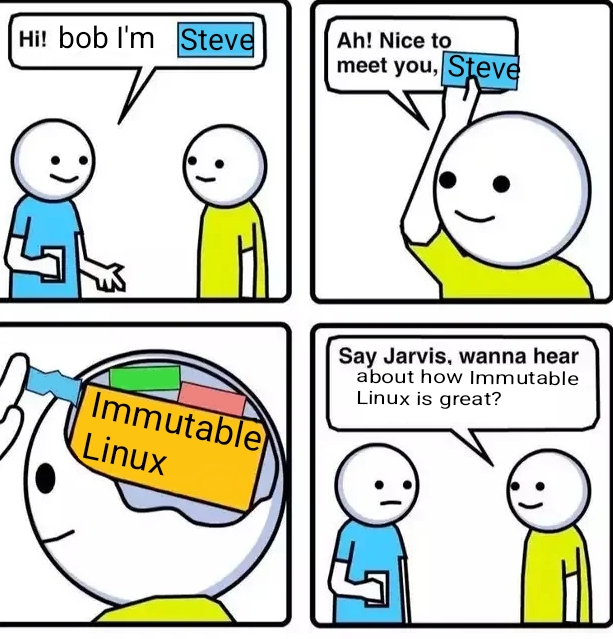OpenSUSE tumbleweed is a good compromise IMO. it is also a rolling release distro with built in snapshotting. So if anything does go wrong it takes ~5 mins to roll back to the last good snapshot. You can set the same thing up on arch but it isn't ootb and YAST is a great management tool as well.
I would say Tumblewees is better than traditional Fedora.
But the lack of desktops, variants, adoption, as well as the lack of being able to reset a system, makes it less stable than Fedora Atomic Desktops.
Resetting is huge. You can revert to a bit-by-bit copy of the current upstream.
It is not complete at all, but already works as a daily driver. uBlue deals with almost all the edges that are left.
Is there a good sort of middle ground distro between the reliability of Debian and the up-to-date packages of arch?
This guy:

(OpenSUSE Tumbleweed).
Or maybe Slowroll.
Fedora is a good middle ground, it's what Asahi Linux uses as its official distro
Another upvote for Fedora. I tried SO many flavors over the years and every single one of them, while cool and neat up front eventually developed “something” that was too problematic.
So I asked for a recommendation with a very specific set of things that I needed from a distribution. Everybody told me to just stop messing around with different flavors and just go with plain old vanilla Fedora.
It has been rock solid and perfect in every way, and I no longer have that need to distrohop because I’m missing something.
Absolutely. Here's three options
Fedora updates every, or around every, 3 months. This is very stable but very up to date.Most professional devs particularly ones working in Linux projects use it fornit's relative stability while having modern packages.
There's also PopOS! which is a rolling release, updating daily, but much more delayed than arch thus being much more usable.
Now for my favourite, OpenSuse Tumbleweed. Same style as PopOs but with a KDE, or gnome spin or of the box. A bit more sleek too. It also has YAST which is the best GUI based managment system on Linux.
I use arch (btw) but have a second duel booted tumbleweed install for work related stuff in order tonensure stability
Wait, Pop_OS switched to rolling release?
From their website:
"Update on Your Terms
Pop!_OS provides the latest features and security patches through rolling updates and periodic OS version upgrades, to be performed at your discretion. And if you want a clean slate, the Refresh Install feature resets your OS while preserving the files in your Home folder. "
Pop OS is very much not a rolling release
I've found openSUSE tumbleweed to be the perfect mix between stable and constant updates. By default uses brtfs so if you break something the fix is a simple as rolling back to the snapshot that was automatically made right before the update
OpenSUSE Tumbleweed.
To be honest PopOS is great. Frequent updates, good (subjective) design and ui choices, just works. If it fits your vibe I would say it is a good balance!
Fedora is generally pretty good
Debian Stable isn't the only way to run Debian though people often act like it. That said, if you want the stability of Debian Stable then run it with the nix package manager (nix-bin).
Or with Flatpak!
What's wrong with Ubuntu/Mint/PopOS/Fedora or any of the distros usually recommended? They're easier to maintain and more up to date than Debian
I wouldn't call them up to date but they are a little newer than Debian with the exception of Pop OS.
You could.. of course also try to use Debian Testing (which is more stable than Debian Unstable), but also more up to date than just Debian Stable.
https://wiki.debian.org/DebianTesting And see also: https://www.debian.org/releases/testing/ (currently "trixie" is the testing release).
EDIT: I mention this, because nobody mentioned it yet.
For private use? Hot take, but Arch. It's easy to maintain and not easy to break at all. I think I spend zero time on maintenance other than running package updates. I only reinstall when I get a new computer.
(I say for private use only because you'll be getting weird looks from people if you use arch on a server in a professional setting, and it might break if you try to update it after five years of not doing it since there aren't any "releases" to group big changes - in practice I run arch on my home server too with no issues)
OpenSUSE Tumbleweed. Rolling release, but has QA on the weekly builds. It fits between Debian and Arch for sure.
This may be an unpopular opinion, but NixOS. It has package up-to-dateness comparable to (and sometimes better than) Arch, but between being declarative (and reproducible) and allowing rollbacks, it's much harder to break. The cost is, of course, having to learn how to use NixOS, as it's a fair bit different to using a "normal" Linux distro.
Arch is easy to maintain and is stable enough. Of course you can make Arch unstable if you do greedy stuff, but if you use like a normal person, it will be fine
It's using Arch for 5 years now and I never broke my system, for example
Tumbleweed
fedora maybe?
I would say:
- Fedora if you like a point release, which means that every 6 months you do a big update of core stuff like the desktop environment, and on Fedora everything else is always generally up to date.
- OpenSUSE Thumbleweed if you like a rolling release, which means that you don't do big updates, everything is kept to the last version that the software repository has, this is how arch works except in Thumbleweed the repositories are updated slower than in arch and less likely to break.
But you could also go for any more up to date debian-based distro, like Pop_OS or even Ubuntu, they might be easier for a newbie user. Fedora and OpenSUSE will be more up to date though.
If you do use Ubuntu, don't stick to just LTS versions, use the last version available (which right now happens to be an LTS version). The "extra support" it offers is not something desktop users care about, it's outweighted by the benefits of more updated software.
SuSE Slowroll. Not rolling release. Also not super-conservative like Debian is.
Debian-Testing (Trixie) is the way to go. It's a rolling release, but it's very stable, because packages end up there after being tested in Sid (their unstable rolling release). Whatever makes it out of Trixie, ends up on the normal Debian. I've been running it since April without any breakages.
Nobody here for Mint? I’m a long time Ubuntu user but when i do my next upgrade it will be to mint.
Both Ubuntu and mint are debian based.
Debian and learn to use the nix package manager for your bleeding edge stuff
Probably not the place to ask, but. Say In a n00b and have Arch (EndeavourOS BTW) on a 15+ year old laptop. Everything works fine hardware wise. Software is fairly basic web, Inkscape, LibreOffice.
Do I really need all the latest Arch updates? Or can I just do an update say every 6 months?
Replace Arch with Ubuntu and the answer is yes. Arch based that's not a good idea.
The reason is that in 6 months lots can have changed, and Arch is not guaranteed a stable base, so updates might assume you have certain versions or things might break because you should have done a middle step during the upgrades that you didn't which is now buried in months of update news in the wiki.
If you want to only update your system every six months, Arch is not ideal, it's likely to work, but not guaranteed.
I guess I'm kind of confused as to the debate between Bleeding Edge vs Stable. I get the concept on paper, but what packages are so imperative that you need a Distro that is "Bleeding Edge". I run Pop_OS and it works great on my hardware(System76 so it kind of has the home field advantage). I have an old laptop running LMDE that doesn't ever need rebooted and it has every package I need for it to accomplish its job.
Others have given better advice than I will, but maybe determine why you need something that's bleeding edge. If the only answer is "Cuz Shiny new stuff!" I don't think it's needed that bad and tailor your setup for stability and functionality. I prefer Just Works Distros though. VM's are also a thing if you want to do some Distro Hopping
My server has been on Endeavour OS (arch with a gui installer) for at least 18 months. I run updates roughly every 10 days (basically whenever I remember). Never had a problem with it. I dare say it could go horribly wrong at some point so I keep the LTS kernel installed as well just as a fall back.
My main pc is also running Endeavour OS (dual boot with windows 11). Other than having to keep Bluetooth downgraded to support the ps5 dual sense controller, it runs great.
My only gripe is that updates often contain something that forces the kernel rebuild process and so it needs a reboot afterwards.
Every other Linux I've run has had some sort of "rebuild to fix" type issue at some point, or had been hard to find good support information for. Endeavour OS has been the most reliable and the easiest to fix and find support for.
Atomic distros + distrobox/toolbx. Bluefin is a good start for general desktop or Bazzite for gaming (But Bluefin can be more stable, I use it for some games with steam in flatpak). If something breaks roll back to any release in the last 90 days with a single command. Install all of your packages in a distrobox (Arch if you need it). Otherwise in general Fedora is pretty good.
Fedora, Ubuntu etc. use up to date packages if you're using flatpaks and snaps. Nix I suppose fits the bill better but it's a harder distro to "learn" than arch imo
How about Rhino? Rolling release of Debian Sid iirc
Linux
From Wikipedia, the free encyclopedia
Linux is a family of open source Unix-like operating systems based on the Linux kernel, an operating system kernel first released on September 17, 1991 by Linus Torvalds. Linux is typically packaged in a Linux distribution (or distro for short).
Distributions include the Linux kernel and supporting system software and libraries, many of which are provided by the GNU Project. Many Linux distributions use the word "Linux" in their name, but the Free Software Foundation uses the name GNU/Linux to emphasize the importance of GNU software, causing some controversy.
Rules
- Posts must be relevant to operating systems running the Linux kernel. GNU/Linux or otherwise.
- No misinformation
- No NSFW content
- No hate speech, bigotry, etc
Related Communities
Community icon by Alpár-Etele Méder, licensed under CC BY 3.0
